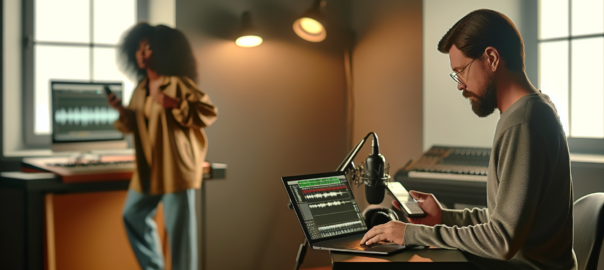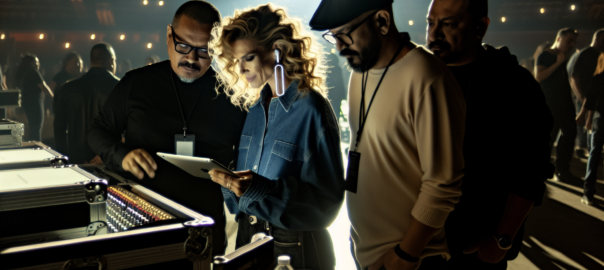Apple Creator Studio finally bundles pro audio, video, and design tools into one affordable subscription for musicians.
Apple just changed the workflow for independent artists. A single bundle now puts Logic Pro, Final Cut Pro, MainStage and more into one subscription. It’s powerful. It’s practical. And it’s priced to reach bedroom producers and touring acts alike. Starting January 28, the suite is available for $12.99/month or $129/year, with students at $2.99/month. For context on Apple’s recent strides in mobile audio, see my earlier piece about Apple’s iPhone recording updates here. This feels like the missing bridge from sketch to release.
I grew up singing in opera houses and building sounds in tiny rooms. I once recorded a demo on an iPhone between classes and dreamed of finishing it on a pro rig. With GarageBand-to-Logic compatibility, that dream is now a one-click reality. I still laugh thinking my first live rig was a backpack of adapters; now artists get MainStage in the same package as Logic. Traveling between Barcelona, London and Silicon Valley taught me to carry less gear and more ideas. Apple Creator Studio feels like the laptop-era equivalent of a touring roadie that actually fits under the seat.
Apple Creator Studio
Apple Creator Studio is a strategic bundle that combines headline apps to serve musicians, producers and indie labels. The suite launches January 28 and costs $12.99/month or $129/year, with a student rate of $2.99/month. That pricing makes advanced tools accessible to creators who traditionally waited for sales or used piecemeal subscriptions. Apple calls this a “studio-grade” experience across Mac and iPad, and it ships with Logic Pro, Final Cut Pro, MainStage and Pixelmator Pro among others.
What’s new in Logic Pro
The Logic Pro update is the marquee feature for many. New AI-driven tools include an AI Synth Player that performs electronic parts, a Chord ID utility that transcribes chord progressions from audio or MIDI, and Quick Swipe Comping now on iPad for mobile vocal editing. These features read as a built-in session band and a personal music-theory assistant. For musicians who move between devices, native GarageBand compatibility remains a practical workflow advantage.
Video, visuals and live performance
Apple Creator Studio folds in Final Cut Pro with Beat Detection to sync cuts to music automatically. That feature alone could speed content creation for social clips and music videos. MainStage transforms Macs into performant live rigs, while Pixelmator Pro on iPad covers cover art and social branding. The suite intentionally blurs audio, video and design, acknowledging that modern musicians must deliver polished visuals alongside sound.
Why this matters now
Independent musicians now have a path from idea to release without swapping platforms. Start a sketch in GarageBand on iPhone, open the project in Logic Pro for pro mixing, cut video in Final Cut Pro with Beat Detection, then prepare EPKs in Keynote or Pages. Apple’s offering is built around cross-device portability and affordability. The Hypebot summary of the launch outlines these specifics and the launch date; see the original announcement at Hypebot for details.
For musicians considering whether to switch or subscribe, the question is practical: does $12.99/month replace a patchwork of apps and save time? For many creators, the answer will be yes. Use cases span bedroom producers, touring singer-songwriters using MainStage, and DIY artists handling their own visuals. Apple Creator Studio isn’t just a bundle; it’s an integrated toolkit designed around modern independent workflows.
Apple Creator Studio Business Idea
Product: Launch a cloud-native collaboration platform called StudioLink that syncs Apple Creator Studio projects across teams in real time. StudioLink offers hosted Logic Pro session streaming, collaborative comping, version control, and integrated Final Cut Pro timelines for remote editors. It includes a rights and stems management dashboard for releases.
Target Market: Independent labels, small production houses, remote session musicians, and content creators who need low-latency collaborative editing and streamlined delivery to DSPs and socials.
Revenue Model: Freemium tier with limited collaborative hours. Subscription tiers at $14.99, $49.99, and $149/month for pro teams. Add-on fees for storage, stems mastering, and distribution. Enterprise licensing for educational institutions and indie labels.
Why Now: Apple Creator Studio standardizes file formats and brings AI assistants to workflows. With Logic Pro and Final Cut Pro integrated in a $12.99/mo bundle, creators will demand collaborative, cloud-first workflows. StudioLink monetizes collaboration on top of Apple’s growing creator stack, filling a gap between local apps and cloud collaboration tools. This is a timely, defensible SaaS play for the post-pandemic remote-creation era.
One Toolset, Endless Possibilities
Apple Creator Studio signals a shift: creators get pro tools without a pro budget. That democratization accelerates output and raises standards. Musicians can iterate faster, publish smarter, and craft visuals that match their sound. Will every artist adopt it? No. But many will. Which feature would you use first: AI chord detection, Beat Detection in Final Cut Pro, or MainStage on tour? Share how you’d fold this into your process.
FAQ
What apps are included in Apple Creator Studio? Apple Creator Studio bundles Logic Pro, Final Cut Pro, MainStage, Pixelmator Pro, plus premium features in Keynote and Pages. The suite is available January 28 and is designed for both Mac and iPad workflows.
How much does Apple Creator Studio cost? Pricing is $12.99/month or $129/year. Students and educators pay $2.99/month. The price covers the integrated suite across Mac and iPad and updates to included apps.
Can I move GarageBand projects into Logic Pro? Yes. GarageBand files are natively compatible with Logic Pro, enabling seamless transfer from iPhone or iPad sketches to full Logic sessions for mixing and mastering.









